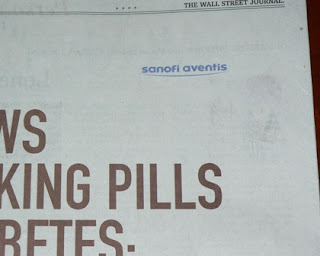The demise of Exubera has received a lot of insightful & funny coverage in various blogs that Pharmalyst reads (
PharmaGiles,
PharmaGossip,
Pharmalot,
Pharma Marketing Blog etc). Pharmalot's redaders have
voted it a "Kindlerberg Disaster". In doing so they were perhaps voting for PharmaGiles
clever play on the Hindenberg disaster rather than pinning the blame on Pfizer CEO Jeff Kindler. However there are some hints that Mr. Kindler hasn't completely escaped the consequences as evidenced by this quote from a
post on The IN VIVO Blog:
"For Kindler, this hardly seems like a fair shake for his first year as CEO. Will investors view him as a stoic leader making tough decisions to clean up someone else's mess? They may. However, this could be the last time Kindler gets the benefit of the doubt."Pharmalyst's own view is that Mr. Kindler should not get any of the blame. In fact if anything, this is perhaps the one gutsy move where Mr. Kindler has shown that he is a "fact-based manager" rather than a "faith-based manager" or a "hubris-based manager" like his predecessor. Pharmalyst's very first blog
post (on March 25, 2007) expressed the view that "
with the benefit of hindsight, this product should never have been launched". It seems that Mr. Kindler has recognized that sunk costs are sunk and that there are other projects with prospects of a better RoI that could use the dollars that Exubera was sucking up.
Pharmalyst was even more impressed with Mr. Kindler's decision to kill their NextGen Exubera.This was supposed to address some of the issues of Exubera version1 - such as a bulky inhaler. In light of this decision, it is time that Lilly/Alkermes, Novo & others re-evaluate their inhaled insulin projects very carefully...if these are not viable, then these companies should pull the plug early and avoid PFEs fate of having to do a $2.8 billion write-off later. The following factors in Pharmalyst's view, bring the viability of these inhaled insulins into question:
1. Lung Function Tests: Just yesterday Alkermes
reported that their product also showed slightly reduced lung function. This alone may be enough for NICE etc to deny reimbursement. In the US, private and medicaid insurance will have a zillion complications with the billing codes for the tests etc and physicians will view this as a hurdle. There are also concerns around lung cancer etc over the long term.
2. Dosing: Looks like some of these products are providing better options here than Exubera but this too may be a challenge
3. Cost: Exubera had a higher price point than the injectable versions.So it was not a viable product in emerging markets (some of which do have a high prevalence of diabetes). The payers in Europe will not reimburse unless clear economic value (higher compliance etc is demonstrated and Pfizer seems to have failed in this area). In the US, the insurers force customers to pay higher co-pays or will not cover the costs for the inhaler. So in both developing and developed markets, the price point of these inhaled insulins will be a critical factor.
4. Using insulins early: Witness the full page ads that Sanofi has been taking out in US newspapers asking patients to consider insulin early....this has proved to be a hard sell.
5. Finally there is the prospect of being blindsided by some other way of delivering insulin. Look at
this BBC report showcasing a project by UK company Diabetology and Cardiff University - apparently they are exploring ways to deliver insulin in a pill.




 The rumored Pfizer plans of a stake in Sanofi have been widely covered in the press and elsewhere. Pharmalyst read one interesting article in Forbes magazine (alas he can't find the link any more) which made the right case that Pfizer should not buy Sanofi but instead should form an alliance with them.
The rumored Pfizer plans of a stake in Sanofi have been widely covered in the press and elsewhere. Pharmalyst read one interesting article in Forbes magazine (alas he can't find the link any more) which made the right case that Pfizer should not buy Sanofi but instead should form an alliance with them.
 I've got to say PharmaFraud has been posting a lot of interesting, informative stuff. Pharmalyst reads this blog every day. Check it out if you haven't already.
I've got to say PharmaFraud has been posting a lot of interesting, informative stuff. Pharmalyst reads this blog every day. Check it out if you haven't already.

 Tuesday's Wall Street Journal had an interesting article (subscription required) regarding some trading activity involving BMS options.
Tuesday's Wall Street Journal had an interesting article (subscription required) regarding some trading activity involving BMS options.